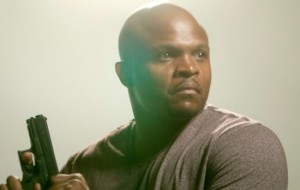Archive for category Writing
My Ruined Tolerance of the Disposable Black Man
Posted by kjohnson1585 in Film, Television, Uncategorized, Video Games, Writing on April 30, 2013
Is IronE Singleton aware that the internet’s support for him is ironic in nature? Hell, is the internet aware? (SPOILERS for the TV show The Walking Dead, the movie Chronicle, and the video game Binary Domain.)
Perhaps the support is part comic, part pity, and part ironic. Perhaps there is legitimate respect in Singleton’s portrayal of T-Dog, the now-deceased African-American character on the hugely popular but extremely flawed The Walking Dead. Perhaps the internet – showing a surprising amount of critical savvy in the realm of developed characters – supported Singleton because he was working with so little of a character, with so little worth. T-Dog, metaphorically, was awesome because T-Dog, literally, was not, and Singleton did the best he could.
This is nothing new. African-American characters dying in horror films (and in all forms of entertainment nowadays) have been normalized to the point way past parody. I’m not even concerned about that, per se, as problematic as it is. The Walking Dead, however, seem to have codified it into something uncomfortably explicit – practically a rule of the show. To be specific, when another African-American male was introduced in an episode, they would kill off the previous one. They killed T-Dog when they introduced Oscar. They killed Oscar when they introduced Tyreese. They barely even let an entire episode pass by without two African-American males alive and well, and they never even spoken to each other at any length. (To be fair, there are two African-American females – Michonne and Sasha [and they have not talked to each other yet either]. I don’t have too much hope for Sasha, but as of right now, progress is progress.)
T-Dog’s death was particularly sloppy. A character whose development was as detailed as a sponge, T-Dog suddenly had a religious epiphany as he sacrificed himself to save Carol, which left Glenn alone with the wonderful, completely-out-of-nowhere exposition of detailing T-Dog’s background (he apparently drove old people to church). I’m willing to give a little benefit of the doubt though. The Walking Dead has had a number of issues behind the scenes, with creatives and executives alike. It has a number of issues with its female characters as well – a point that deserves its own essay and has been written about extensively. But being alive, they can redeem themselves – or at least redeem themselves in death, which Lori in some ways had done (lesser so with Angela, but writing isn’t the show’s strong point). The Walking Dead has made its black men disposable to the point that two black characters can’t even talk to each other, without a dramatic reason why. The Token Black Man Death has gotten so uncomfortably common that I can’t even laugh at it anymore.
I was watching Chronicle, a short but interesting film that takes on the emotional struggle of mentally unstable teens through the thematic use of burgeoning super powers. It was a taut, surprisingly thorough film that kept me quite interested… up until the point that they killed off Steve (Michael B. Jordan). I wish to god that didn’t effect me like it did, but my heart sank and I had to leave the room for a moment. Steve was nice, charming, and genuinely helpful towards the end of his life. He tried to really help the troubled teen Andrew as he grew more angry and antagonistic. The film clearly used that death to spur the impetus to get Andrew’s cousin, Matt, to deal with Andrew once and for all. But the “death as motivator” trope is already overdone. Adding that racial component only speaks to the systemic issues within the creative field.
How overused has this become? When reading a list of underrated video games of 2012, many people mentioned Binary Domain as one of them. And it was a surprisingly solid game, with tight mechanics, great graphics, and a delicious and deep sci-fi plot bolstered by very unique, personality-filled characters. It didn’t take itself seriously, and the VO was perfect for the tongue-in-cheek dialogue. Boss fights were tough and huge. Everything was running smoothly… until the end. The black character, Bo, sacrifices himself to save the love interest of Faye, in service to protagonist, Dan. There’s a dramatic, touching scene of Dan talking to Bo as he lay dying. It’s well done, especially in context with the series of big reveals that came before it. But of all the characters – and there are a lot of them – did it have to be Bo? And why only him? There’s five other perfect characters that could have been the lamb.
Here’s the kicker. Three completely different pieces of entertainment from three entirely different media all killed off their only black male characters solely in service to the white protagonist. This is ridiculous. And yes, people of all races, generally speaking, were killed (not so much in Binary Domain, but it’s a moot point since mostly everyone were robots). And I’m not claiming that creators should be forced to do something they do or do not what to do, creatively. The problem is that there are already so few black characters in our media, fewer of them developed beyond a single note. (Odd, since The Walking Dead is located in Atlanta with a high black population, and Binary Domain often deals with military groups, groups that often have large African-American numbers.) Why can’t they live happy lives? Why can’t they survive? Why are they seemingly always killed to ensure the happiness/survival of their white peers? Why did THREE totally different development teams all make this same decision?
Women in media are killed for white, male protagonist to go on revenge sprees (add in a little rape or refrigeration to make it “serious”). Black men, on the other hand, are killed in sacrifice to save their Caucasian others. Both are awful, but at least now there seems to be an attempt to really make it a point to bring the treatment of female characters in media to light. African-Americans and other minorities need to definitely speak up and campaign strongly against this, and demand better from writers and creators.
Moffat and the Allegorical Doctor Who
Posted by kjohnson1585 in Film, Television, Uncategorized, Video Games, Writing on April 16, 2013
Of all the events that transpired in the Doctor Who episode “The Rings of Akhaten,” the one thing that stuck with me was the moment that the Doctor and his newest companion Clara talked with an alien about renting a space moped. In lieu of cash or credits, the aliens on the world of Akhaten wanted objects of sentimental value. The more sentiment behind the object, the Doctor explains, the more its value, its worth. The episode continues then with all these other concepts like gods, stories, memories, songs, meaning, and “the most important leaf in human history” (and we’ll get to this in a second), but for the most part I kept thinking about this concept of buying a tangible object with another tangible object that has intangible meaning to a single individual. Then it hit me – this really is fucking stupid.
Why? The idea of an alien species valuing an object with meaning behind it is not even science fiction. It’s not even LIGHT science fiction. It’s the hacky, emotional reject of an young adult fiction novel. Of all the goofy, fun moments in The Fifth Element, no one said that the idea of “the fifth element being love” was one of them. As dark as Harry Potter gets, Harry surviving Voldermort’s attack when he was a child due to his parents love is not exactly well-respected. So when Doctor Who trades Clara’s ring (which was passed down from her “mum”) for the moped, we’re way past a soap operatic science fiction show. We’re entering allegory territory. The problem isn’t that science fiction can’t have allegorical concepts; it’s that the overall show as an philosophical allegory is just not interesting. We’re not watching a show with real characters and crazy plots that build around a theme; we’re watching a show about concepts, ideas, and themes, embodied in random characters and plots. Doctor Who is all about meaning now, and it’s bothering me.
Moffat seems strangely obsessed with myths, concepts, and intangibles. He’s weirdly taken to ideas, ideas so specific that it’s off-putting. His clever-by-half take on the series embodies this, where characters seem perfectly quippy and quirky, speaking in Lost-ian like language that no human (or alien!) would actually, or even theoretically talk like. It’s getting to House-like levels of silliness now, when in it’s final three or four seasons, every character talked like observational theorists, able to suss out the essence and emotions of every other character. Everyone became a fucking detective of human life.
The entirety of Doctor Who is now a “fucking detective of life”. This would explain everything – the lack of urgency, the labyrinthine story arcs, the obsession over the “Doctor Who?” question (which was always played for a joke… until now!), the questionable presentation of Manic Pixie Dream Girls as companions, the ideas of fear and love and song and memory being catalysts for plot contrivances, the nonsensical EVERYTHING involving River Song, the ruination of potentially great monsters like The Silence and The Fallen Angels. All of these plots and characters are nothing but vessels for Moffat and his writing staff to muse on life and the universe’s greatest mysteries, like the meaning of love and fear and friendship and death. Moffat probably decided to avoid returning to Daleks because he couldn’t make them into a metaphor for anything. The Cybermen, though? The cold, mechanical robots with no feeling? Oh, yeah, we’ll see them again.
Beyond this all being questionable sci-fi, the bigger issue is that these themes and his opinion on them are NOT universal. He doesn’t seem to present a nuanced side to these things, nor seem to delve to much into various opinions of it. His arc concerning the Doctor’s death could have been a powerfully dramatic moment for the character. Matt Smith sells it well, but it ultimately leads to nowhere, branching out into bizarre one-note areas, like in “Let’s Kill Hitler,” where he was poisoned and, for some reason, ran back to the TARDIS to talk to an image of a young Amy Pond to… express regret? It’s a nice moment but had absolutely no bearing in the actual plot of the episode and felt rather extrameous. Or in “Vincent and the Doctor,” a dramatically powerful episode to many, but its clear that Moffat wanted to talk about depression and loss, not necessarily create an actual plot-driven episode of TV that supposed to last 52 minutes. (And the less said about “Closing Time,” the better.)
And so we’re back to the “most important leaf in human history,” which – what? The most important leaf in human history gave you a raccoon tail and ears and allowed you to fly. Clara, your leaf being apparently stronger than the history of the Doctor’s travels is nonsense. Even worse, his metaphorical nonsense doesn’t even hold under scrutiny. Moffat (or in this case, writer Neil Cross) holds that history is finite but the future is forever, and somehow the leaf represents infinity but the Doctor’s life doesn’t, despite the fact that the Doctor, presumable, will be living a LOT longer (and his experiences bare more for the future), but the leaf actually represent past events (the marriage of Clara’s parents) and kinda doesn’t bare anything to the future, save for what Clara would believe and — do you see what I’m getting at here? A whole lot of run-around bullshit. And it’s bullshit that lacks the foresight of contrarian and differentiating viewpoints, so it’s not even WELL-THOUGHT bullshit.
I was somewhat pleased with “Cold War,” which gave purpose and agency to the characters, and even allowed Clara to feel vulnerable and unsafe for once. I wasn’t too pleased with the deus ex machina of the Ice Warrior’s arriving ship, and it seemed like Clara’s fears were tossed aside in the end. But at least those critiques come from elements of substance, writing, and character, instead of the broad swath of allegorical ideas that seem to be present nowadays. Here’s hoping that we can see Doctor Who become more character and plot based as the season winds to a close.
The (Psychopathic) Double-Talk of Sports Culture
Posted by kjohnson1585 in Television, Uncategorized, Writing on April 9, 2013
The fallout of the media portrayal of the Steubenville rapists sheds much needed light on how grossly manipulative the language of sports culture has become. Sadly, this isn’t the first time we’ve seen this, nor the last.
ThinkProgess – a site that I’m not particularly fond of linking to due to its direct biases – managed to put together a pretty apt summery of how various news reports on the Steubenville rape case and verdict heavily portrayed the football players in a positive light. They were not horrendous monsters who took gleeful advantage of an inebriated sixteen year old teenager, but apparently nice if confused boys who ruined their futures due to a “mistake” perpetuated by some drunken sixteen year old girl. While it was hard to invoke a particular perspective on the girl since her name was withheld, the opposite approach – utilizing a fall from grace narrative while implying a potential comeback – was just as filthy and foolhardy.
As I follow this story, I keep thinking of the Manti Te’o incident.
To wit, Te’o, a promising linebacker out of Notre Dame, had a girlfriend. She apparently was in car accident, was in the hospital for several days, and then died. And then she came back to life. You see, Te’o’s girlfriend was imaginary, a product of a hoax perpetuated by one Ronaiah Tuiasosopo. Te’o never visited her. Not even when she was in the hospital because “it never crossed his mind”. It was such a bizarre series of events that even attempting to figure it out would be logistically impossible.
Or maybe it isn’t. At the risk of hurting some of my credibility, has anyone thought that maybe Manti Te’o might just be a fucking idiot?
When the Te’o story broke, and news reports came flooding, I was particularly struck by the tone of the language and the direction of the information. It questioned Te’o’s mental state, sure, but only passingly. More analysis was about his NFL stock price and the broad meaning of it all in relation to football, and in particular, Ronaiah Tuiasosopo got the most coverage as some kind of Joker-esque, closeted homosexual prankster, instead of some dude who got caught up in some kind of joke he couldn’t possibly believe he was getting away with. Even Jon Stewart, a personality known for calling out fucking morons, spent waaaaaay too many episodes cracking jokes about Ronaiah Tuiasosopo fooling people, along with his particularly-strange name.
It was fascinating. If any other average person was fooled or mistaken at such a high level – like this woman who fell for the Nigeran prince scam or this woman who accidentally drove 900 miles out of the way to pick up a friend – reporters and commenters alike who joke, directly or in a rib-nudging way, of these people inherent gullibility. If these people treated those victims like they treated Te’o, we’d have large-scale reports on Nigerian scams and the fallibility of GPS systems.
Sports culture is out of control. The incredible lengths that people and reports will go to glorify its venerable athletics is, at best, sad, and at worst, disgusting. The idea of a computer gamer having a made-up gamer is responded with derision and laughter. The thought of a NFL draft prospect having a made-up girlfriend is responded with think-pieces, in-depth interviews, and some of the most laughable round-tables in the history of sports. I didn’t watch too much ESPN when the incident hit the airwaves, but I probably would have thrown-up in disgust. ESPN, mind you, was the network that spend days on the replacement refs screw-up in the Seahawks/Green Bay game, all but guaranteeing that this wouldn’t affect NFL/referee negotiations, only to do EXACTLY THAT.
But beyond that, sports reporting has gone from the factual exploration of the game and the effect of it on rules, team, franchise, etc., and into a creepy narrative of player exaltation. The worshiping of questionable murder accomplice Ray Lewis, the redemption of dog abuser Michael Vick, the complete brushing off of the sexual misconduct of Ben Roethlisberger – it’s a grotesque re-interpretation of awful human beings based on their physical success. (And yes, football is a particularly egregious case, but people like Kobe Bryant and Roger Clements are just as guilty.) And yet the media glorifies them to no end. So, yeah, it’s no surprise that this rape case has been less about the problematic freedom athletes seem to think they have (particularly towards women) and the redemption narratives that the media so awkwardly cling to. It’s Storytelling 101, and it really needs to stop.
I see two uncaring monsters up in that picture up there, monsters who thought they could get away with anything (including debasing and ruining a young girl’s life), and in some ways, they did – their sentences were relative slaps on the wrists, and although the bitching about their ruined football careers is loud and clear, they aren’t exactly out of the running. Either way, it’s disgusting, vile, and embarrassing for everyone involved. So of course, we’ll be seeing it again real soon.




